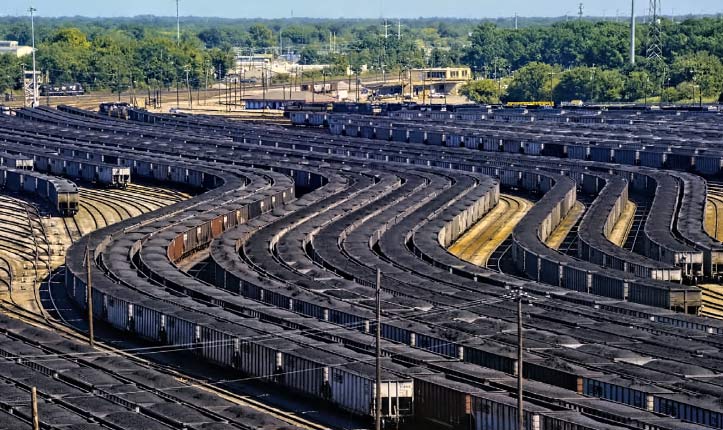
A Virginia statute only allows railroads to charge broadband fiber installers a $2,000 fee regardless of the location or characteristics of the railroad property to be crossed. A railroad lobby lawsuit filed this week states that short times and cost caps apply equally to crossing a 6-foot-wide single-track right-of-way as it would to crossing Northern Southern Railway’s (pictured above) 3,600-foot-wide, 212-track Lamberts Point Coal Terminal in Norfolk, VA that can handle up to 6,200 coal cars.
The Association of American Railroads wants a new Virginia law streamlining broadband providers’ access to railroad property invalidated. In a federal court lawsuit, it alleges that it amounts to an illegal taking and violates both the state and U.S. constitutions. They said it treats railroads, unlike any other landowner, “seizing from them and giving broadband service providers a permanent easement to access and occupy railroad lands.”
The Virginia Code, Ann. § 56-16.3, grants broadband service providers a statutory right to cross and permanently occupy railroad works, including “tracks, bridges, facilities, and all . . . rights of way or easements” for a one-time fee of $2,000 and direct expenses not to exceed $5,000.
In the past, some states have capped railroad crossing fees at less than $2,000. Iowa appears to have the lowest fee at $750, but it allows railroads to charge utility flagging fees.
The statute provides that the railroad company shall approve the broadband service provider’s fiber optic crossing application within 35 days of receiving the application.
The fee is $1,000 if the service provider attempts to cross “a section of track that has been legally abandoned under an order of a federal or state agency” and “is not being used for railroad service.”
The lawsuit states that the statute applies “regardless of the location, nature, or characteristics of the railroad property to be crossed.”
The complaint notes that short times and cost caps would apply equally to crossing a 6-foot-wide single-track right-of-way as it would to crossing CSXT’s Acca Yard in Richmond, which consists of approximately 36 tracks spanning roughly 80 acres, or NSR’s 3600 foot-wide, 212 track Lamberts Point Coal Terminal in Norfolk.
They claim the statute does not require broadband service providers to comply with the railroad’s engineering and safety policies.
They also identify that the statute provides no mechanism by which railroads can require changes to a crossing application to protect rail operations and guard against safety risks.
They allege that if a broadband service provider submits a poorly drafted application or an application for a poorly engineered crossing, railroads will be burdened with absorbing the additional cost above the $5,000 direct expense cap associated with reviewing and correcting the application’s flaws to avoid safety risks and interference with rail operations.
They said the statute’s “direct-expenses cap thus incentivizes broadband service providers to shift costs to the railroad.”

















